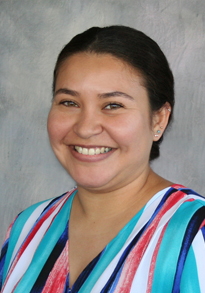Maricela Cruz, PhD
Biography
Maricela Cruz, PhD, strives to create useful and widely applicable methodology to tackle real-world problems in public health. Her research primarily focuses on developing novel statistical methods to assess and evaluate the impact of complex health care interventions. In her research, she uses statistical techniques for interrupted time series, time series, correlated data, change point detection, longitudinal data and interventions research.
Dr. Cruz received her PhD in statistics from the University of California Irvine. During her time there, she was a National Science Foundation Graduate Research Fellowship awardee and Eugene Cota-Robles fellow. She worked with care delivery experts and practitioners to design and conduct statistical analyses that assessed health care interventions across multiple hospitals and hospital units. She developed two novel interrupted time series models that allow for complex correlation structures that can change post intervention and are adequate for single- and multi-unit continuous data. To communicate and encourage access to her methods by non-statisticians in the broader public health community, Dr. Cruz produced an application in R Shiny that analyzes interrupted time series data. As a graduate student, she was a summer associate at the RAND Corporation. While at RAND, she led a collaborative study examining the relationship between group cohesion and climate with alcohol use outcomes in a group therapy intervention for individuals with a first-time offense for driving under the influence.
At KPWHRI, Dr. Cruz works alongside researchers in behavioral health, mental health, and insurance design. She explores the relationship between weight change and diabetes measures and the built environment, aids in the development of suicide risk prediction algorithms, and evaluates interventions that encourage high-value use of health care services.
RESEARCH INTERESTS AND EXPERIENCE
Recent Publications
Bender M, Murphy EA, Cruz M, Ombao H. System and unit-level care quality outcomes after reorganizing frontline care delivery to integrate clinical nurse leaders: a quasi-experimental time series study. J Nurs Admin. 2019 49(6), p. 315-322.
Cruz M, Bender M, Ombao H. A robust interrupted time series model for analyzing complex health care intervention data. Stat Med. 2017 Dec 20;36(29):4660-4676. doi: 10.1002/sim.7443. Epub 2017 Aug 29. PubMed
- ← Previous
- 1
- 2
- 3
- 4 (current)
- Next →
New findings

Simpler models to identify suicide risk perform similarly to more complex ones
Models that are easier to explain, use could have better uptake in health care settings.
M2H study

Can where you move impact future weight gain?
A new study finds that moving from low- to high-density neighborhoods might be related to reductions in weight gain.
Research

Built environment plays little role in weight gain
New research suggests fast food and other aspects of built environments don’t affect weight, contrary to earlier findings.



